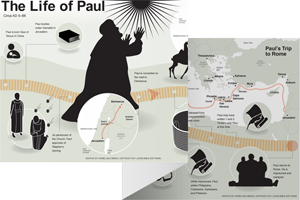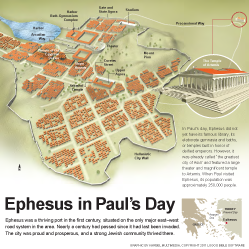1:1–2 The oldest copies of this letter do not include the Greek phrase en ephesō (“in Ephesus”) in Eph 1:1, which may indicate that Ephesus was not the original destination. Ephesians might have been a circular letter—one that was intentionally written for a wide audience and sent to multiple places. If so, it could be the letter mentioned in Col 4:16 as being sent to the church at Laodicea. The reference to Ephesus might have been inserted later, perhaps to reflect the letter’s first destination. Since Paul had spent several years in Ephesus (Ac 19:10), several statements in the text implying that Paul was unfamiliar with his audience (Eph 1:15; 3:2) lend support to the circular-letter theory. |
1:1 Paul, an apostle See note on Rom 1:1.
 Paul: A Life of Redemption and Transformation
Paul: A Life of Redemption and Transformation
 Pauline Self-Designations Table
Pauline Self-Designations Table
by the will of God See Eph 3:7–13.
saints The Greek word used here, hagioi, refers to those who are set apart or who belong to God, not to the moral quality of being without sin.
 Hagioi/Hagios Word Study
Hagioi/Hagios Word Study
Ephesus A harbor city located in southwest Asia Minor (modern-day Turkey); capital of the Roman province of Asia.
1:2 Grace to you and peace See note on Rom 1:7.
1:3–14 In the Greek text of Ephesians, Paul uses one long sentence stretching from Eph 1:3 to v. 14. He praises God for His blessings, which are mediated through Christ, and introduces the letter’s major themes, including God’s plan of salvation (vv. 5, 9) and the work of the Spirit (v. 14). |
1:3 Blessed is This expression of praise is known in Hebrew as the berakhah, which means blessing (compare Pss 66:20; 1 Pet 1:3). Paul praises God for what He has done through Christ and reminds believers of their status and privileges in Christ. Paul’s blessing highlights the roles of the Father (Eph 1:3–4), Christ (vv. 5–7), and the Spirit (vv. 13–14).
is known in Hebrew as the berakhah, which means blessing (compare Pss 66:20; 1 Pet 1:3). Paul praises God for what He has done through Christ and reminds believers of their status and privileges in Christ. Paul’s blessing highlights the roles of the Father (Eph 1:3–4), Christ (vv. 5–7), and the Spirit (vv. 13–14).
Father Paul’s preferred designation for God in his letters (e.g., Rom 1:7; 1 Cor 8:6; Phil 2:11).
every spiritual blessing Refers to the range of blessings in Eph 1:3–14 made available in Christ.
heavenly places See v. 20 and note.
in Christ Refers to the believer’s union and identification with Christ. Paul repeats this phrase throughout the letter to emphasize the work of Christ and the blessings that believers obtain through Him.
1:4 he chose Here Paul applies to believers a concept that formerly applied to Israel alone (see Deut 7:6–8; compare Rom 9:11 and note; 2 Thess 2:13 and note). Just as God chose Israel as His treasured possession, He now elects believers to receive the blessings mediated through Christ.
foundation of the world Implies that God made His choice at some unidentified time in the past.
holy Refers to being dedicated to or set apart for God. See note on Eph 1:1.
for God. See note on Eph 1:1.
blameless Refers to being without fault before God.
1:5 predestined The Greek word used here, proorizō, means “to choose” or “to decide beforehand.”
means “to choose” or “to decide beforehand.”
adoption Refers to the bestowing of familial rights and privileges on a person born outside the family. Paul uses this metaphor to illustrate believers’ privileges in Christ. As children of God, they now have a heavenly inheritance (vv. 11–14). Compare Gal 4:5 and note.
they now have a heavenly inheritance (vv. 11–14). Compare Gal 4:5 and note.
1:6 the Beloved A reference to Jesus.
to the praise of the glory A unique phrase found only in this blessing (Eph 1:12, 14) as a liturgical expression of praise to God.
1:7 redemption The Greek word used here, apolytrōsis, refers to the act of paying to free a slave. See also Col 1:14 and note.
through his blood Refers to Jesus’ sacrificial death on the cross (Rom 3:24; Rev 5:9).
1:9 mystery In Paul’s writings, the Greek word used here, mystērion, refers to God’s plan of salvation, which was formerly kept secret but is now revealed in Christ. This plan includes the unification of Jews and Gentiles into one new people of God (Eph 3:3, 5–6, 9).
1:10 administration The Greek word used here, oikonomia, can refer to God’s plan of salvation or to the sphere of Jesus’ authority during His earthly life.
fullness of times God’s previously hidden plan has now been revealed to believers through Christ, the focal point of God’s redemptive activity (compare 3:1–9).
bring together The Greek verb used here, anakephalaioō, means “to sum up” or “head up.” Later in Ephesians, Paul describes Christ as the “head” (kephalē) of the Church (vv. 22–23; 4:15; 5:23).
heavens and the things on the earth God’s work in Christ extends over all creation, including the heavens (see v. 20 and note).
1:11 we Reflecting Paul’s own ethnicity, “we” likely refers to Jews—God’s chosen people (in the ot) and those from whom the Messiah came (see Matt 10:5 and note, 10:6; 15:24 and note; Acts 1:8 and note; Rom 1:16 and note). This means that “you” often refers to Gentiles (non-Jews), including most of the believers in Ephesus and the surrounding areas (see Eph 2:11; 3:1). Compare note on 2:17.
were chosen From the Jewish perspective, this likely refers to the salvation brought about by the Jewish Messiah, Jesus. Such an understanding coheres with passages like Deut 7:6; 9:26; 14:2; 32:9.
having been predestined See note on Eph 1:5.
1:12 we who hoped beforehand in Christ See Matt 10:5 and note, 10:6; 15:24 and note; Acts 1:8 and note; Rom 1:16 and note.
glory Denotes honor and majesty. See note on Rom 1:23.
1:13 you Refers to the Gentiles (see note on Eph 1:11). Paul stresses that the same inheritance (v. 14) God gave to Jews is also made available to non-Jews according to God’s revealed mystery (vv. 9; 3:3–9).
word of truth Refers to the gospel message, explained in the following clause as “the gospel (euangelion) of your salvation.” This is the message about the Messiah, Jesus, which was originally proclaimed to Jews and later embraced by Gentiles.
 Euangelion Word Study
Euangelion Word Study
you were sealed In the ancient world, a seal indicated ownership and protection (compare Dan 6:17 and note; 2 Cor 1:22). The notion of sealing in this context is related to the Day of Judgment: Sealed believers will be kept for their ultimate inheritance—redemption at the end of the age (Eph 1:14)—by the gift of the promised Spirit (Ezek 36:26–27; Joel 2:28–30), which is given to Jews and Gentiles alike.
1:14 down payment The gift of the Holy Spirit not only empowers believers to live holy lives (Eph 3:16), but also serves as a guarantee and reminder that God will one day fully complete His work in believers.
inheritance Refers to the complete experience of the salvation that God promises to His people but which they have yet to receive in full. This experience culminates in their redemption upon Jesus’ return.
1:15–23 After elaborately praising God for His blessings (vv. 3–14), Paul expresses thankfulness for the believers. The prayer in vv. 15–23 is the first of two prayers in the letter (compare 3:14–21) that, together, enclose Paul’s discussions on God’s work of reconciliation (2:1–22) and his own role within God’s plan (3:1–13). The first prayer has three parts: a thanksgiving to God for the Ephesians’ maturity in the faith (vv. 15–16); an intercessory prayer on behalf of the Ephesians, asking God to give them wisdom and knowledge to comprehend the riches of His blessings (vv. 17–19); and a digression on the “power of God” that guided God’s plan of salvation, raised Jesus from the dead, and seated Him at God’s right hand to rule over all powers (vv. 20–23). |
1:15 Because of this Connects Paul’s prayer to the preceding blessing section. Paul’s thanksgiving for God’s plan of salvation in Christ in vv. 3–14 overflows into prayer in vv. 15–23.
your love Although Paul uses similar phrases in his other writings (e.g., Col 1:4; Phlm 5; compare Rom 1:8, where only “faith” is mentioned), these words are missing in some of the earliest Greek manuscripts.
1:16 in my prayers Paul does not delight in his own personal fame or achievements; he delights in the faith and love of other believers. The Ephesians’ faith and love is the reason for Paul’s ceaseless prayer of thanksgiving. Their new way of living is evidence that his work is worthwhile (Phil 2:16; 1 Thess 3:5).
 Prayers in Paul’s Letters Table
Prayers in Paul’s Letters Table
1:17 a spirit of wisdom and revelation The Greek text here may refer to an attitude or disposition that the Holy Spirit brings to a person’s life: one willing to receive and communicate the things of God. Alternatively, the text may refer to the Holy Spirit and attributes that characterize the Spirit.
1:18 hope The Greek word used here, elpis, refers in this context to the fullness of salvation that believers will experience at Christ’s return (see Eph 1:14 and note). Paul highlights three blessings the believers can expect: hope for the future, God’s claim on them as His inheritance, and the great power of God Himself at work on their behalf.
among the saints Throughout the Bible, God sets apart people for Himself (Exod 5:1; Hos 1:10; Heb 8:10). Here, Paul again adopts language commonly used for Israel and applies it to Gentiles (see note on Eph 1:1, 4).
1:20 raising him from the dead Jesus’ resurrection displayed God’s power over death and His approval of His Son (compare Isa 53:10 and note; Isa 53:12 and note).
right hand Implies that Christ holds a position of honor and authority with God the Father. This idea comes from Psa 110:1, which early Christians frequently cited to affirm their belief that God had raised Christ to a position of divine power over evil powers (e.g., Acts 2:34–35; see Psa 110:1 and note).
heavenly places A reference to the spiritual world to which believers now have access through Christ. In this realm believers experience spiritual blessings and share in Christ’s authority over evil forces (compare Eph 1:3; 2:6; 3:10).
1:21 above all Because of His resurrection and ascension, Christ is supreme over everything.
rule and authority and power and lordship This phrase seems to refer to angelic or evil forces of power in the heavenly places (see v. 20 and note). Paul argues that Christ has ultimate dominion over all things.
 New Testament Terms for Unseen Divine Beings
New Testament Terms for Unseen Divine Beings
also in the coming one Within Judaism time was generally divided into two ages—the current one, when God’s rule is not fully manifest, and the coming one, when God will reveal His sovereign rule as king (see Matt 12:32; Mark 10:30). Christ’s death, resurrection, and exaltation enable believers to live under God’s rule in this age. This same phrase is used in Rom 12:2 and 1 Cor 2:8. Compare 1 John 2:15 and note.
1:22 under his feet In ancient times, a king who placed his foot upon the neck of his defeated foe demonstrated power and victory. Paul applies this imagery to Christ. Since God raised Christ to sit beside Him, all things are subject to Him (Pss 8:6; 110:1; Acts 2:35; Heb 10:13; compare Heb 1:13 and note).
1:23 the one who fills all things A reference to Christ as the completion, fulfillment, or end to all things. As such, this phrase describes His accomplishments and authority.

|
About Faithlife Study BibleFaithlife Study Bible (FSB) is your guide to the ancient world of the Old and New Testaments, with study notes and articles that draw from a wide range of academic research. FSB helps you learn how to think about interpretation methods and issues so that you can gain a deeper understanding of the text. |
| Copyright |
Copyright 2012 Logos Bible Software. |
| Support Info | fsb |
 Loading…
Loading…






